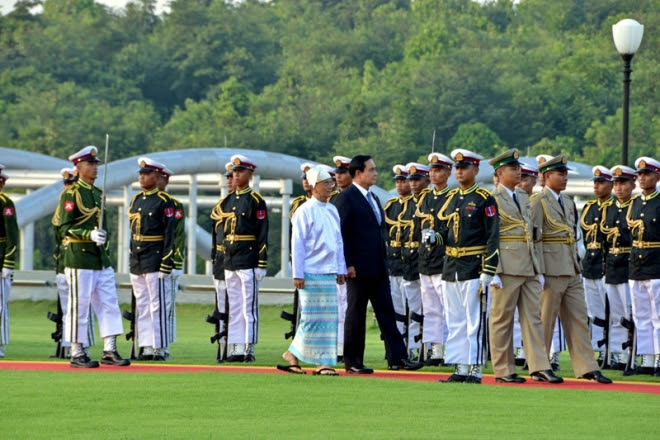Myanmar hosts Thai PM’s first foreign foray Thai Prime Minister Prayut Chan-O-Cha arrived in Myanmar on October 9 in his first overseas foray since grabbing power in a coup, as he seeks to redouble economic ties with the kingdom's emerging neighbour.

The Thai junta ruler is set for talks with fellow former general President U TheinSein, who swapped his uniform three years ago for civilian clothes as Myanmar shrugged off full military rule.
Mr Prayut, who retired as army chief last month, is chasing international legitimacy for an administration which has suspended Thailand's democracy and imposed sweeping curbs on dissent since toppling the elected government on May 22.
Before departing for the Myanmar capital NayPyi Taw, the premier said he would broach a wide range of topics during the visit -- from strengthening regional body ASEAN to migration.
"We have to reduce distrust and contain small problems, reduce red tape, reduce border conflicts," Mr Prayut told reporters at Bangkok's military airport.
The two leaders will also discuss issues including kick-starting the stalled Dawei deep-sea port project and the cross-border drug trade, government spokesman Mr YongyuthMayalarap told AFP earlier.
"Over the last year the political situation has made it difficult for Thailand to play its previous role in international relations," he said.
Myanmar economics expert Mr Sean Turnell said the relationship between the Southeast Asian neighbours "economically as well as politically, has been on autopilot for quite a while now".
"I think this visit will do enough to keep Dawei on 'life support', but nothing much more than this," Mr Turnell told AFP.
The Dawei mega-project was tipped as a project to tempt foreign investors to Myanmar -- and give Thailand a gateway to the Indian Ocean and Western markets.
But it has faced funding difficulties, with Italian-Thai Development (ITD) scaling back its involvement last year, while local communities have raised concerns of land-grabbing.
Mr Turnell, associate professor at Australia's Macquarie University, said the huge project required more financial and political capital than was likely available.
But he added that it was unlikely it would be completely shelved since it was one of the few shared issues that is not "sensitive".
Island murders
Officials said the murder of two British tourists on a Thai resort island is also likely to be high on the agenda after two Myanmar nationals were charged with rape and murder last week over the crime.
Reports in Myanmar media have said the suspects told a lawyer that they confessed to the crime under duress, prompting rights groups to demand a probe into their treatment.
Thai authorities deny using the pair as scapegoats in a case that has turned a spotlight on the darker side to the "Land of Smiles", and tarnished its reputation as a tourist paradise.
U TheinSein "will ask about the two arrested Myanmar workers whom have been accused of murder", a senior official from the president's office in NayPyi Daw told AFP.
Another official confirmed that Mr Prayut had landed in NayPyi Taw and would hold a meeting with U TheinSein before dining with the Myanmar leader.
Mr Prayut, 60, retired at the end of September from a near four-decade career with the coup-prone army.
However, he retains extensive powers as the prime minister of a military-stacked cabinet and head of the junta -- the National Council for Peace and Order -- whose authority has been guaranteed by an interim constitution.
The gruff former general has vowed to steer reforms to reboot Thailand and excise the country of corruption before holding new elections.
U TheinSein, himself a former junta prime minister, took office in 2011 after elections ended outright junta rule.
The bespectacled 69-year-old has been at the forefront of dramatic political and economic reforms that have opened the long-isolated country to the world and raised hopes of a bloodless democratic transition in the run up to landmark elections next year.
The nation is now run by a quasi-civilian administration, although the army retains a 25 percent bloc of parliamentary seats.



